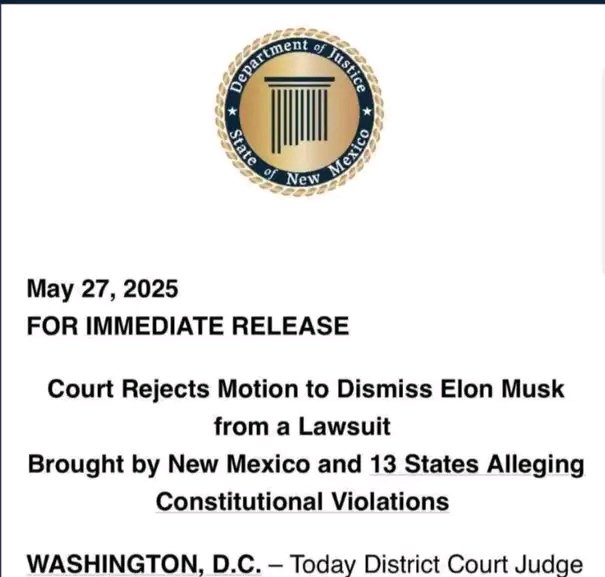Federal Judge Allows States’ Lawsuit Against Elon Musk and DOGE to Proceed
On May 27, 2025, U.S. District Court Judge Tanya Chutkan denied the Trump administration’s motion to dismiss a lawsuit filed by New Mexico and 13 other states against Elon Musk and the Department of Government Efficiency (DOGE), allowing the case to move forward.
The lawsuit, initiated in February, alleges that Musk, appointed to lead DOGE by President Trump, exercised sweeping executive authority without proper constitutional appointment. The states argue that DOGE’s actions—including unauthorized access to federal data systems, unlawful termination of federal employees, and cancellation of contracts—violate the U.S. Constitution.
Judge Chutkan’s ruling affirms that the states have standing to sue and that their claims merit judicial review. While the court dismissed the claims against President Trump personally, it allowed the suit against Musk and DOGE to proceed, stating that the plaintiffs made a credible argument that Musk’s actions were not legally authorized.
New Mexico Attorney General Raúl Torrez, leading the coalition, hailed the decision as a critical step in upholding the United States’ system of checks and balances. He emphasized the importance of defending the Constitution and preventing the dangerous precedent of allowing individuals to dismantle federal agencies and access sensitive state data without lawful authority.
The lawsuit contends that Musk’s significant influence and cost-cutting efforts required official nomination and Senate confirmation, criticizing the lack of Congressional authorization for DOGE. Since Trump’s return to office in January, DOGE has been aggressively reducing federal spending and eliminating agencies deemed wasteful, actions that have raised legal concerns.
Judge Chutkan previously denied a request to temporarily block DOGE’s access to federal data systems and its authority to terminate federal employees, citing insufficient grounds for a restraining order. However, she acknowledged valid concerns about Musk’s authority and the constitutional implications of DOGE’s actions.
The case emerges amid broader concerns over the legal boundaries of DOGE’s access to government data, especially in light of outdated statutes governing such authority. The legitimacy of Musk’s authority under DOGE is being questioned in nearly 20 federal lawsuits, yielding varying judicial outcomes.
As the lawsuit proceeds, it will test the limits of executive power and the constitutional requirements for appointments and agency authority. The outcome could have significant implications for the balance of power within the federal government and the role of private individuals in public administration.
